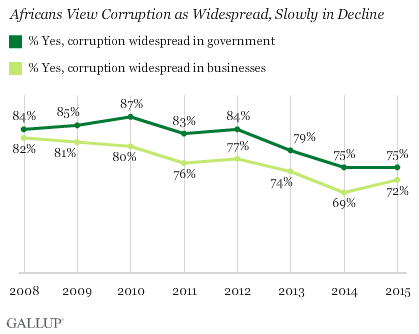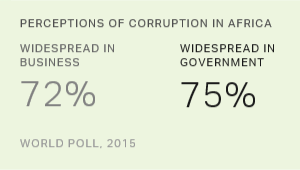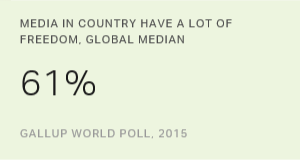Story Highlights
- About three in four view corruption as widespread in government, business
- Perceptions of corruption have improved modestly since 2008
- Rwandans least likely to see corruption in government
FEEEDS Advocacy Initiative, Gallup and Allafrica.com are hosting an event on Thursday in Washington, D.C., ahead of the second U.S.-Africa Business Forum to examine the continent's investment environment and highlight the role of the African Diaspora in Small and Medium Enterprise (SMEs) job creation.
WASHINGTON, D.C. -- Majorities in sub-Saharan Africa view corruption as widespread in the government (75%) and businesses (72%) in their countries -- two barriers to foreign investment in the resource-rich continent. However, these perceptions have improved modestly since 2008, when more than four in five African adults perceived corruption as widespread in both the public and private sectors. Perceptions of corruption in sub-Saharan Africa now rate slightly better than in Latin America and the Caribbean, where 77% see government corruption as widespread, and are on par with the average for post-Soviet states (74%).

Though Nigeria's embattled economy boasts abundant human and natural resources, more Nigerians say that corruption is widespread in their government (95%) than do residents in any other country in sub-Saharan Africa. President Muhammadu Buhari -- elected last year on an anti-corruption platform -- has cracked down, but has thus far struggled to reform a system in which corruption is pervasive at nearly every level of society. In Tanzania, which Gallup surveyed before President John Magufuli's election, nine in 10 (90%) view government corruption as widespread, staking a similarly difficult path for the country's new leader to fulfill campaign promises.
Rwanda stands apart from other countries in 2015, with fewer than one in 10 (7%) saying corruption is widespread throughout their government. Rwanda's success in battling corruption is well-documented. In recent years, anti-corruption watchdog Transparency International reported Rwanda's corruption levels as "negligible," while the country's "zero tolerance" corruption policy requires all high-ranking officials to declare assets on an annual basis.
| Yes | |||||||||||||||||||||||||||||||||||||||||||||||||||||||||||||||||||||||||||||||||||||||||||||||||||
|---|---|---|---|---|---|---|---|---|---|---|---|---|---|---|---|---|---|---|---|---|---|---|---|---|---|---|---|---|---|---|---|---|---|---|---|---|---|---|---|---|---|---|---|---|---|---|---|---|---|---|---|---|---|---|---|---|---|---|---|---|---|---|---|---|---|---|---|---|---|---|---|---|---|---|---|---|---|---|---|---|---|---|---|---|---|---|---|---|---|---|---|---|---|---|---|---|---|---|---|
| % | |||||||||||||||||||||||||||||||||||||||||||||||||||||||||||||||||||||||||||||||||||||||||||||||||||
| Nigeria | 95 | ||||||||||||||||||||||||||||||||||||||||||||||||||||||||||||||||||||||||||||||||||||||||||||||||||
| Ghana | 91 | ||||||||||||||||||||||||||||||||||||||||||||||||||||||||||||||||||||||||||||||||||||||||||||||||||
| Tanzania | 90 | ||||||||||||||||||||||||||||||||||||||||||||||||||||||||||||||||||||||||||||||||||||||||||||||||||
| South Africa | 88 | ||||||||||||||||||||||||||||||||||||||||||||||||||||||||||||||||||||||||||||||||||||||||||||||||||
| Chad | 87 | ||||||||||||||||||||||||||||||||||||||||||||||||||||||||||||||||||||||||||||||||||||||||||||||||||
| Kenya | 86 | ||||||||||||||||||||||||||||||||||||||||||||||||||||||||||||||||||||||||||||||||||||||||||||||||||
| Uganda | 84 | ||||||||||||||||||||||||||||||||||||||||||||||||||||||||||||||||||||||||||||||||||||||||||||||||||
| Malawi | 82 | ||||||||||||||||||||||||||||||||||||||||||||||||||||||||||||||||||||||||||||||||||||||||||||||||||
| Zambia | 80 | ||||||||||||||||||||||||||||||||||||||||||||||||||||||||||||||||||||||||||||||||||||||||||||||||||
| Madagascar | 79 | ||||||||||||||||||||||||||||||||||||||||||||||||||||||||||||||||||||||||||||||||||||||||||||||||||
| Across 32 sub-Saharan African countries surveyed in 2015 | |||||||||||||||||||||||||||||||||||||||||||||||||||||||||||||||||||||||||||||||||||||||||||||||||||
| Gallup | |||||||||||||||||||||||||||||||||||||||||||||||||||||||||||||||||||||||||||||||||||||||||||||||||||
| Yes | |||||||||||||||||||||||||||||||||||||||||||||||||||||||||||||||||||||||||||||||||||||||||||||||||||
|---|---|---|---|---|---|---|---|---|---|---|---|---|---|---|---|---|---|---|---|---|---|---|---|---|---|---|---|---|---|---|---|---|---|---|---|---|---|---|---|---|---|---|---|---|---|---|---|---|---|---|---|---|---|---|---|---|---|---|---|---|---|---|---|---|---|---|---|---|---|---|---|---|---|---|---|---|---|---|---|---|---|---|---|---|---|---|---|---|---|---|---|---|---|---|---|---|---|---|---|
| % | |||||||||||||||||||||||||||||||||||||||||||||||||||||||||||||||||||||||||||||||||||||||||||||||||||
| Rwanda | 7 | ||||||||||||||||||||||||||||||||||||||||||||||||||||||||||||||||||||||||||||||||||||||||||||||||||
| Ethiopia | 40 | ||||||||||||||||||||||||||||||||||||||||||||||||||||||||||||||||||||||||||||||||||||||||||||||||||
| Togo | 47 | ||||||||||||||||||||||||||||||||||||||||||||||||||||||||||||||||||||||||||||||||||||||||||||||||||
| Somalia | 47 | ||||||||||||||||||||||||||||||||||||||||||||||||||||||||||||||||||||||||||||||||||||||||||||||||||
| Ivory Coast | 50 | ||||||||||||||||||||||||||||||||||||||||||||||||||||||||||||||||||||||||||||||||||||||||||||||||||
| Mozambique | 52 | ||||||||||||||||||||||||||||||||||||||||||||||||||||||||||||||||||||||||||||||||||||||||||||||||||
| Senegal | 58 | ||||||||||||||||||||||||||||||||||||||||||||||||||||||||||||||||||||||||||||||||||||||||||||||||||
| South Sudan | 60 | ||||||||||||||||||||||||||||||||||||||||||||||||||||||||||||||||||||||||||||||||||||||||||||||||||
| Burkina Faso | 62 | ||||||||||||||||||||||||||||||||||||||||||||||||||||||||||||||||||||||||||||||||||||||||||||||||||
| Guinea | 63 | ||||||||||||||||||||||||||||||||||||||||||||||||||||||||||||||||||||||||||||||||||||||||||||||||||
| Across 32 sub-Saharan African countries surveyed in 2015 | |||||||||||||||||||||||||||||||||||||||||||||||||||||||||||||||||||||||||||||||||||||||||||||||||||
| Gallup | |||||||||||||||||||||||||||||||||||||||||||||||||||||||||||||||||||||||||||||||||||||||||||||||||||
Bottom Line
With Africa's business-friendly population and opportunities for market growth, African GDP and foreign direct investment are increasing at a rate significantly higher than the global average. Still, corruption remains a serious impediment to outside investment, raising production costs and increasing uncertainty on future returns. According to the Mo Ibrahim Foundation, corruption in Africa costs the continent $148 billion per year, an amount equivalent to roughly 25% of the continent's GDP. Efforts to promote job creation in Africa's rapidly growing private sector need to come in tandem with strong policies promoting transparency and accountability. Increased investment in key African markets requires the kind of stable business environment and transparency that endemic corruption erodes.
The data in this article are available in Gallup Analytics.
Survey Methods
Results are based on face-to-face interviews with approximately 1,000 adults in each country, aged 15 and older, conducted between 2008 and 2015. For results based on the total sample of national adults, the margin of sampling error ranged from ±3.4 percentage points to ±4.0 percentage points at the 95% confidence level. The margin of error reflects the influence of data weighting. In addition to sampling error, question wording and practical difficulties in conducting surveys can introduce error or bias into the findings of public opinion polls.
For more complete methodology and specific survey dates, please review Gallup's Country Data Set details.
Learn more about how the Gallup World Poll works.




